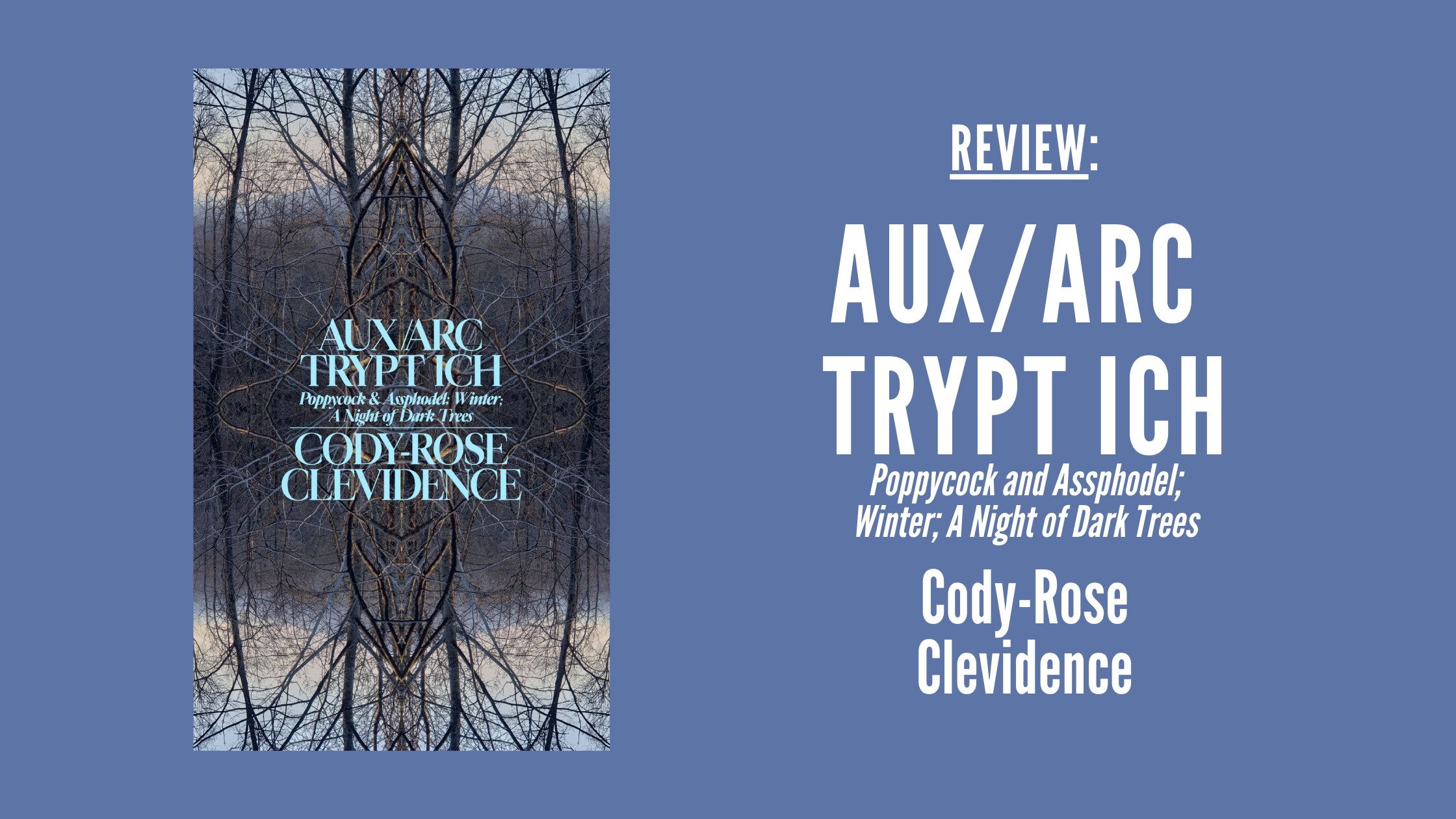REVIEW : AUX/ARC TRYPT ICH / CODY-ROSE CLEVIDENCE
When a book is purchased through one of our reviews, round-ups (etc.) we receive an affiliate commission.
Aux/Arc Trypt Ich:
Poppycock and Assphodel; Winter;
A Night of Dark Trees
Cody-Rose Clevidence
Review by
Sage
The Search For Making: On Cody-Rose Clevidence’s Aux/Arc Trypt Ich
You could say a poem is a collision on a molecular level begetting a single mixture derived of many elements. It is alchemical, mystical, a realignment of structures. You could say a poem is where heaven collides with the world, or where the mind of the poet collides with the mind of the reader, or where music collides with the body. The form of poetry has for millenia appealed to readers because of the very elusiveness which makes it so challenging for new readers to confront. As it takes innumerable forms, so it lasts innumerable eons and draws innumerable readers into its fold. In their newest collection of poems, Aux/Arc Trypt Ich (Nightboat, 2021), Cody-Rose Clevidence takes on the enormity of such collisions, proving themself a poet of innumerable strategies in the approach to colliding speaker and reader, poet and poem, myth and mundane, visual and aural, queerness and nature. Following the project set up in their earlier works BAEST FEAST and Flung/Throne (Ahsahta), Clevidence triumphantly returns to that mystifying landscape they have created where language itself is queered mayhem tossed abreast the waves as speaker and reader, “Poet” and “You,” muscle through the lush world in search of meaning, or making, or whatever comes where the two collide.
It is impossible to speak of Clevidence’s poetry without beginning in the body, in the physical makeup of their poems. Clevidence’s poetics is as much visual as it is sonic, utilizing the symbology of the keyboard as well as the alphabet. The effect creates a singularly unique voice which sweeps across the material punctuators of language as much as language itself.
be doused {come sudden} th’ spring I reckon [comes]
verily | morphic | be | {ye dim of blink or shook }
rhyme crash on leaf as leaf crash on leaf | {wut}
polinate .by hand /dysph
or [aria{ “of th state of th flesh” what
is this [my nest] go down,
Calliope, catastrophe, my eros
from whim 2 prayer
In regards to gender dysphoria, “from whim 2 prayer” seems as true a rallying cry as any for those who have undergone first the wish, then the deep yearning for the “state of th flesh” to align with the state of their mind and their spirit, the selfhood they have unearthed by virtue of their being.
Fully in their own being, the poems in Aux/Arc Trypt Ich strike a playful balance between raucous humor and a deep clarity of thought. Clevidence makes clever use of this self-interrupting symbology as an irreverent route to actual reverence for the world and its mysteries.
:eyes [plunged in] forsythia, self [caught in?] forsythia— I am
a little [] drunk | off this [relation] this insistence |
which is Being
royally fucked me | forth— [a hangover is a state of Grace]
Colloquial language juxtaposed with the grand, sweeping breadth of material these poems include collude into a sort of screaming chorus of praise reverberating from within a single, unhinged mouth. The poems throughout this book are not only texts of sonic pleasure, but objects of visual stimulation. They arouse multiple senses, as when a mind becomes aroused to sharper awareness, a keener understanding of its place among the various parts and mechanisms of the world at work around one’s own mind. “Touch is th mechanism by which // everything you love | is in the world.” Clevidence so deftly reaches beyond themself with a deep connectivity and understanding of the world that the speaker and reader often collide as much as the visual and sonic, humor and reverence, the myth and the modern.
One such moment where speaker collides with reader occurs near the end of the long middle section, “Winter.”
subside the ache
n echo, blue cloth
over my eyes, th blue
of sky blue
of my river give
me just
grief— give me— just—
“one firm place”
“on which 2 stand—“
Amid the calamity of grief’s “endless pasture” rendered in the onslaught of the book’s dense language, clarity breaks through for a moment as the speaker demands stable ground. (From the ether whispers Archimedes, who says with a lever and “one firm spot on which to stand” he can move the world.) Is there in this collision of speaker and reader a geometry of grief? Is it grief, then, that moves the world, or something firmer, something denser, made of spit and blood and bone, compacted deep inside the body? And if it is grief that gives us the firm place to stand, what gives the lever? This momentary collision Clevidence offers is the touch of the human, the longing for security after great loss or even great love. Clevidence is a poet fully in tune with the human condition to which any reader might feel called, if one only takes the time to absorb the dizzying waterfall of language they present.
Such a dizziness might be the one stumbling block a reader will face when they encounter this book, though dedicated attention is rewarded by the breadth of knowledge Clevidence masters. The speaker of these poems searches through the material of language, references to philosophy and ancient myths, the Internet, and the natural landscape. Clevidence’s eye roves endlessly, resting only for brief moments before flitting on to the next node of data. What do they search for, though? Not meaning, necessarily, as they say “we are always / already in a world of meaning.” Perhaps they search for making. They search to be made. Within the lush ecology of references, memes, and music, poignant moments burst forth where the speaker grapples with philosophy and the nature of existence: “being an organism with needs & desires & th capacity / for excruciating pain. I call th flowers ugly but it is something / in my heart.” Is the “excruciating pain” a self-inflicted byproduct of our own (in)humanity? (The flower is ugly and we call attention to it out of cruelty.) Or, is it a sorrow beyond our control? (The flower is ugly because we feel the need to call it so to make ourselves feel better.) Maybe it is something that wells up from deep within as we witness the world and see it is beautiful, and find we are lacking. Is that really the sum of all existence, the looking and the lacking? Clevidence offers another route: we exist for want of intimacy.
I think the world evolved organisms to feel
it. to crawl across its surface impelled or repelled by the feeling
of it. to hold it inside of them. which we do.
It is through that intimacy with the world Clevidence establishes themself firmly in the Arkansas Ozarks, often relative to nature. Poet of the raw landscape, poet of the visual and music, Clevidence celebrates and sings of their very backyard. “eyes gorged [] on violet / racket of thr Ozark,” and “O arkansas— I profess— to have some real strength / in th heart—where ‘th sun / don’t shine,” and “th Lawlessness of Arkansas / [lawlessness is a state of Grace] where my heart / stands like a lonely bird.” Yet this is not a poet completely isolated from the world wandering through glens and meadows. Clevidence doesn’t hesitate to throw in an “lol” or a “wut,” as if these poems are a series of text messages sent out along optical fibers from some computer brain into the vast cyberspace between the poet and the reader. There is in this an intimacy as well, a far-reaching sense of communion between poet and reader, nature and the self, the self and its own remaking.
Clevidence proposes “we are in- / extricable from th dna of th world around us, our senses / comingled with th sensed ‘without which there would be no / possibility of experience.’” This perhaps is what a reader coming to this poet’s work might be struck by most fiercely. The collision of world and human, poem and reader, poet and me—it is driven by the very makeup of this world. This world which makes us, this world which we make. Clevidence’s poetry so wholly returns me to the body of my body, to an awareness and appreciation for each bud on the newly burgeoning oak tree, for the phone in my hand, for the street piled with snow. We must go and and tend “what wants tending, hellebore, hollyhock, angel of mercy, / don’t flinch.” Don’t flinch, reader. This has to do with you, too. “O make of this,” Clevidence challenges. Take of this work and continue. Take of this world and return something to it. Take of this poetry and make with it poetry. Take of me and love me, as I take of you and love you. Don’t flinch. Look, and see.
Aux/Arc Trypt Ich by Cody-Rose Clevidence is out now from Nightboat Books.
Sage is a writer living in Kansas.




